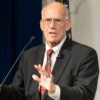Tuesday’s election results aren’t the only outcomes this week likely to impact the future of school choice across the country. Yesterday, the Supreme Court heard oral arguments in the case of Arizona Christian School Tuition Organization v. Winn to determine whether the Grand Canyon State’s scholarship tax credit program violates the establishment clause. The Wall Street Journal writes today:
As ever, the American Civil Liberties Union and other rigid secularists argue that this is unconstitutional support for religion because most parents seek out religiously affiliated programs. A three-judge panel on the oft-overturned Ninth Circuit Court of Appeals bought that argument, reversing a lower court that had upheld the state tax credits.
However, even the Arizona program’s critics concede that every element is religiously neutral and a matter of private parental choice. The state plays only a minor role in administering the tax credits, no role in selecting the donors. While the tax credits reduce state tax revenue, the resulting scholarships also reduce the state’s expense on public education.
But during oral arguments, it quickly became clear that support for school choice programs, or lack thereof, is not just about whether the government is indirectly supporting religious institutions. It has just as much to do with a philosophical belief about the money you earn and how much of it “belongs” to the government.
Paul Bender, arguing against the scholarship tax credit program, suggested that charitable donations made by individuals and corporations to scholarship-granting organizations should really be viewed as government money. From the transcripts:
MR. BENDER: … The STOs [scholarship tuition organizations] are government grantees. They are distributing government funds. The Constitution prohibits organizations that distribute government funds as part of a government spending program to do it on the basis of religion.
JUSTICE SCALIA: That’s a great leap to say that it’s government funds, that any money the government doesn’t take from me because it gives me a deduction is government money. I mean, that’s the first leap you make.
MR. BENDER: This is money that the government takes from people.
JUSTICE SCALIA: This money has never been in the government’s coffers. The government has declined to take this money.
MR. BENDER: But it’s money that’s raised by the state’s income tax. Every tax-credited dollar is a dollar that has to be paid either to the government as income taxes due or to an STO.
…
JUSTICE KENNEDY: … I must say, I have some difficulty that any money that the government doesn’t take from me is still the government’s money.
…
JUSTICE ALITO: … There is a very important philosophical point here. You think that all the money belongs to the government—except to the extent that it deigns to allow private people to keep some of it.MR. BENDER: I do not.
JUSTICE ALITO: It doesn’t take it by taxes.
MR. BENDER: No.
JUSTICE ALITO: That’s what your whole argument is based on.
MR. BENDER: No, it isn’t, Justice Alito. My argument is that if the government imposes an income tax, and people owe the government a certain amount of money in income taxes due, that—and the government says you don’t have to pay it to us, you can pay it to an STO, that that is a payment of government funds.
JUSTICE SCALIA: They don’t owe it to the government if they have made this contribution. That’s the whole point.
Beyond the heated philosophical debate about whether any money the government refuses to take from me is actually government money, the court will be deciding a case that has concrete and profound implications for the parents and children of Arizona. Since 1997, Arizona’s scholarship tax credit program has assisted thousands of children to secure better educational opportunities, helping more than 27,000 children last year alone attend a private school of their choice.
A ruling in favor of the scholarship tax program would establish yet again that school choice is constitutional.
It would be a shame for politics—and a liberal philosophy that holds that the money earned from the hard work ordinary Americans belongs not to them but to the state—would prohibit children from receiving a quality education.
































7 Replies to “School Choice in the Supreme Court: Does All Your Money Belong to the Government?”